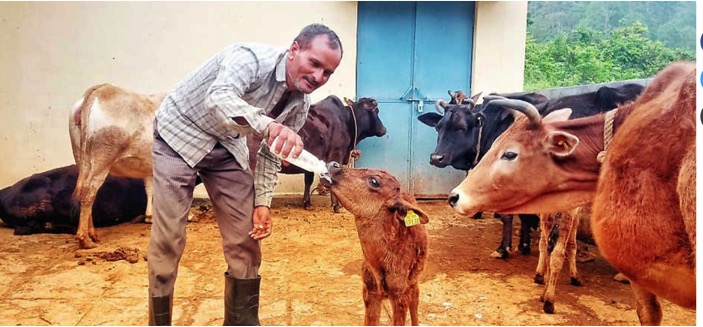To increase the productivity of its indigenous Badri cow, which grazes on herbs that grow in the Himalayas, Uttarakhand is now planning for its genetic enhancement.
At the recent chintan shivir (brainstorming session) that Chief Minister Pushkar Singh Dhami had with senior officials of the State, the Animal Husbandry Department proposed to use sex-sorted semen technology to improve the stock of the petite Badri cattle. Officials proposed to opt for the embryo transfer method to produce more cattle of a high genetic stock.
Apart from Badri ghee, which costs ₹3,000 to ₹5,000 a kg, the State is looking at the marketing potential of gaumutra ark (distilled cow urine), cow dung, and Panchgavya (five products of the cow: curd, ghee, dung and urine).
Talking about the plan, B.V.R.C. Purushottam, Secretary, Animal Husbandry, told The Hindu that the Badri cow, the first registered cattle breed of Uttarakhand, had been certified by the National Bureau of Animal Genetic Resources.
New technologies
“The issue with this variety of cattle is that its milk production capacity is quite less as it gives one to three litres of milk a day. To make the farmers of Uttarakhand breed Badri and not to shift to high milk-producing alternative breeds such as Jersey, we have decided to opt for multiple ovulation embryo transfer (MOET), a conventional embryo flush, which is the most common procedure used in advanced cattle breeding,” Mr. Purushottam said.
The official also said that ovum pick-up in vitro fertilisation (IVF) was the other technology that would be used to increase the yield. The proposal to introduce assisted reproductive technologies (ART) for the project, to generate employment and entrepreneurship through native Badri cattle productivity enhancement, will cost ₹50 crore.
As proposed in the chintan shivir held in Mussoorie in the last week of November, the State aims to achieve its targets in 10 years. The shivir (session) aimed to prepare a road map for Uttarakhand as the State nears 25 years of its formation.
As the plan includes increasing the productivity of the native cattle breed by use of sex-sorted semen to curtail unproductive male population and the production of quality Badri studs for semen production through the embryo transfer technology, the State had set up a nucleus breeding bull mother farm at Nariyal village in Champawat district.
At present, Uttarakhand has nearly seven lakh Badri cattle, among which 4.79 lakh are cows.
The Badri breed derived its name from the holy shrine of Char Dham at Badrinath. Possessing a balanced gait for the hills, the cattle breed is small in size with long legs and varied body colours — black, brown, red, white or grey. This breed is comparatively more resistant to diseases, mostly due to its eating habits.
Grazes on herbs
Officials say what makes the Badri cow stand out is the Himalayan environment, as she eats herbs and does not ingest polythene and other harmful things, and is far from toxic pollution.
“As the Badri cow grazes only on herbs and shrubs available in the mountains, its milk has rich medicinal content and high organic value. The same is the USP of its produce for which its ghee is quite expensive. Its urine has a high value due to its feeding and habitat. The lactation milk yield ranges from 547 kg to 657 kg, with an average milk fat content of 4%,” said R.S. Negi, CEO of the Uttarakhand Livestock Development Board.
Mr. Negi said that Badri cow products were being sold online by Hetha Organics and Badri Ghee was sold by the Uttarakhand Cooperative Dairy Federation under its brand name Aanchal.
“We sell cow urine distillate to Hetha Organics at ₹28 a litre and undistilled gaumutra at ₹5 a litre. We also sell fresh Badri cow dung to a couple of entrepreneurs at ₹1 a kg from which they make products,” he added.
Aseem Rawat, the founder of Hetha Organics, said that the firm had been working on selling and manufacturing indigenous cow products for the past eight years.
Source : The Hindu Dec 12 2022 , by Ishita Mishra

